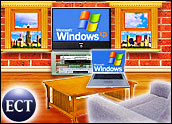
AT&T acknowledged today that it is testing alternative operating systems to the Windows platform it now uses, but said the review is not specifically related to security concerns.
Mike Dickman, AT&T spokesperson, said reports suggesting AT&T might be considering scrapping Microsoft Windows for Linux are “Fiction. Out of context.” He said that AT&T has no intention of dropping Microsoft at this time.
Evaluating Options
Dickman said AT&T CIO Hossein Eslambolchi “is evaluating Linux, Microsoft and Apple operating system platforms just as any responsible CIO would do. These evaluations for the best choice in desktop operating-system platforms are an ongoing process.”
“Hossein is confident that Microsoft will address the security problems,” Dickman said.
The AT&T review drew attention because it comes in the midst of widespread concern about Windows security.
In addition to the spate of viruses this year attacking Windows, antivirus experts recently expressed concern about the possibility of virus attack against Microsoft’s next incarnation of Windows, code-named Longhorn.
Security Concerns
While Linux has been getting substantial buzz as a safe alternative among participants in this discussion, some say it should not be considered the magic bullet for AT&T or any other corporation.
“The security and virus argument for Linux and against Windows is real, but in many, though not all, aspects, that’s a reflection of how much more widely Windows is deployed,” said Gordon Haff, Illuminata senior analyst.
“As Linux gets more widely used on the desktop, we’ll see more viruses and other security vulnerabilities there too,” Haff explained.
Potentially Advantageous
Haff said companies that do move to Linux could realize substantial benefits. “Especially for ‘transactional desktops,’ that is, those being used for a small number of specific tasks as opposed to general-purpose PCs, the cost savings associated with Linux and associated software like OpenOffice can be substantial,” Haff told TechNewsWorld.
Haff sees the Linux march moving to a beat dominated by expenses. “Although moves to Linux are often couched in other reasons such as reliability, security, etcetera, the big driver is usually costs,” he said.









































